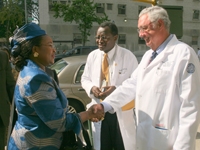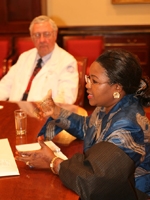During a visit to the United States, First Lady of Tanzania Salma Kikwete—the wife of Tanzanian President Jakaya Kikwete—met with leaders of Weill Cornell's Division of International Medicine and Infectious Diseases on Sept. 18 to talk about the Medical College's burgeoning affiliation with the Bugando Medical Center and the Bugando University College of Health Sciences, as well as Weill Cornell's ongoing HIV/AIDS health-care services.

Dr. Warren Johnson and Dr. Estomih Mtui greet First Lady of Tanzania Salma Kikwete outside the Medical College on York Avenue.
Led in part by Sanford Weill, the chairman of Weill Cornell's Board of Overseers, Fr. Dr. Peter Le Jacq of the Maryknoll Brothers and Sisters, and Dr. Estomih Mtui, associate professor of clinical anatomy in neurology and neuroscience at Weill Cornell, an affiliation between the two institutions was signed earlier this year with the objective of training health-care professionals to work in Tanzania and creating the best medical school in East Africa. During its first year, Weill Cornell's participation in the affiliation will be 50 percent funded by the TOUCH Foundation, an organization that has evolved over the last nine years specifically to address Tanzania's physician and healthcare needs. By January the Medical College plans to have senior residents in internal medicine and pediatrics as well as postdoctoral fellows on-site full time.
"This is a program that we envision extending beyond internal medicine and pediatrics. It will eventually involve the basic sciences as well as other clinical departments," said Dr. Warren Johnson, chief of the Division of International Medicine and Infectious Diseases at Weill Cornell. "This is not just an AIDS program; it will deal with comprehensive health issues there," he said. "But AIDS and HIV are so pervasive that you cannot seriously consider any type of health education and service program without looking at AIDS, tuberculosis and other associated diseases."

Tanzanian First Lady Salma Kikwete discusses goals of the Weill Cornell-Bugando Medical Center affiliation, as well as appreciation for the College's commitment to the region.
Although Weill Cornell's affiliation with Bugando extends beyond HIV/AIDS treatment, First Lady Salma Kikwete expressed interest in Weill Cornell's existing HIV/AIDS programs. There are 40 million people have HIV/AIDS worldwide, with 64 percent of those living in sub-Saharan Africa. In Tanzania alone, as of 2003, the HIV/AIDS adult prevalence rate was 8.8 percent, or 1.6 million people. Women are significantly more affected than men, accounting for 60 percent of the new infections reported among youth aged 15 to 24 years. Some 100,000 children are also infected and AIDS orphans are estimated to be some 2 million, with 13 million children orphaned worldwide as a result of the disease.
Weill Cornell's most prominent international HIV/AIDS outreach program, GHESKIO (Groupe Haitien d'Etudes du Sarcome de Kaposi et des Infections Opportunistes) was founded in Haiti in 1981, during the first years of the AIDS epidemic. It was only the second center in the world at that time dedicated to the study of AIDS. The program began with one physician and a technician; under the direction of Dr. Jean Pape and Dr. Johnson, GHESKIO has grown to more than 300 physicians, technicians, fellows, residents and students working in Haiti, providing antiretroviral drugs to patients and conducting clinical trials with AIDS vaccines and novel combination therapies. A principal focus has been on decreasing transmission rates in several different areas, including perinatal transmissions.
"We can take the lessons that we've learned at GHESKIO and try to develop programs with the college in Bugando to see how we can help contribute to this, as well as some of the other major health issues," said Dr. Johnson.
Speaking to the first lady and the assembled audience in both Swahili and English, Dr. Mtui had a particularly strong stake in the new affiliation. "For me, as a Tanzanian and as a part of Weill Cornell, I am most pleased and privileged to contribute to this relationship. Truly we are making progress and combating disease on the continent."
Photos by Richard Lobell.

